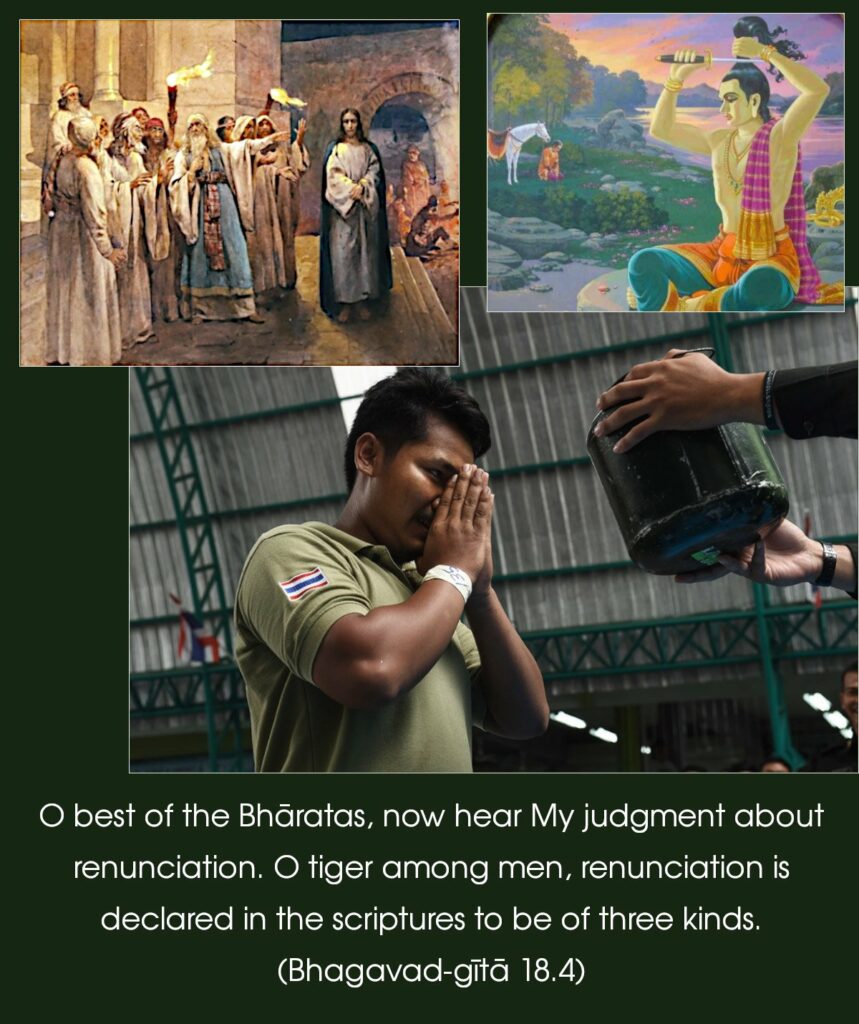निश्चयं शृणु मे तत्र त्यागे भरतसत्तम |
त्यागो हि पुरुषव्याघ्र त्रिविध: सम्प्रकीर्तित: || 4||
niśhchayaṁ śhṛiṇu me tatra tyāge bharata-sattama
tyāgo hi puruṣha-vyāghra tri-vidhaḥ samprakīrtitaḥ
niśhchayam—conclusion; śhṛiṇu—hear; me—my; tatra—there; tyāge—about renunciation of desires for enjoying the fruits of actions; bharata-sat-tama—best of the Bharatas; tyāgaḥ—renunciation of desires for enjoying the fruits of actions; hi—indeed; puruṣha-vyāghra—tiger amongst men; tri-vidhaḥ—of three kinds; samprakīrtitaḥ—declared
Translation:
O best of the Bharatas, best of men, Arjuna! hear now my final decision about (this problematic) tyaga (the abandoning of Karma): Tyaga has been declared to be three-fold.
Commentary:
The Lord states the difference very clearly (1) give up all Karma as evil, say the philosophers, (2) perform sacrifices, austerities and charity, do not abandon them”- others say.
Nischayam srunu me: “Now listen to my decision”, says the Lord. The great Master does not leave the disciple in doubt about any spiritual problem. “This is my decision”, says Krishna. Who can have any doubt about the Lord’s decisive declaration? Others, who are subject to Maya, may err in their views and opinions, however learned they might be. But how can the Lord, who is the Ruler of Maya, who knows all about man, his nature, and his goal, state anything mistaken or erroneous? When He declares, “Now listen to my decision” – it is final, beyond all doubt. Let everybody understand that Lord as much as he can, let him follow His prescribed conduct as best as he can and transcend the evils of samsara. May the Lord be the guiding light in this darkness of ignorance. May His word be the law of conduct for all seekers.
Question: What is the nature of Tyaga?
Answer: It is three-fold (Sattvic, Rajasic and Tamasic).
Bhagavad Gita: Chapter 18 🔻 (78 Verses)
| 01 | 02 | 03 | 04 | 05 | 06 | 07 | 08 | 09 | 10 |
| 11 | 12 | 13 | 14 | 15 | 16 | 17 | 18 | 19 | 20 |
| 21 | 22 | 23 | 24 | 25 | 26 | 27 | 28 | 29 | 30 |
| 31 | 32 | 33 | 34 | 35 | 36 | 37 | 38 | 39 | 40 |
| 41 | 42 | 43 | 44 | 45 | 46 | 47 | 48 | 49 | 50 |
| 51 | 52 | 53 | 54 | 55 | 56 | 57 | 58 | 59 | 60 |
| 61 | 62 | 63 | 64 | 65 | 66 | 67 | 68 | 69 | 70 |
| 71 | 72 | 73 | 74 | 75 | 76 | 77 | 78 |
